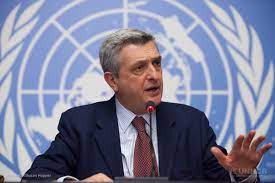BANGKOK, Oct 17 : The U.N. High Commissioner for Refugees urged the international community on Tuesday not to forget the plight of ethnic Rohingya refugees from Myanmar in the midst of many other world crises. More support is needed to help the displaced Rohingya and also relieve the burden on the countries hosting them, High Commissioner Filippo Grandi said.
Grandi said providing humanitarian assistance is becoming increasingly difficult because of the continuing armed conflict in Myanmar and reduced funding and aid due to the other crises, including in Afghanistan, Ukraine and the Middle East.
Speaking on the sidelines of a regional meeting on Rohingya refugee assistance in Bangkok, he emphasized that a “voluntary, dignified return to Myanmar” by the Rohingya refugees is the most desirable solution, but acknowledged there are “many challenges that need to be overcome.”
“What I have asked the participants in this meeting is to make big pledges in support of the Rohingya refugees: open policies for the host countries, contributions for the donor countries and for everybody else across the world, and attention by the international community,” he said.
More than 1 million Rohingya refugees have fled from Myanmar to Bangladesh over several decades, including about 7,40,000 who crossed the border starting in August 2017, when Myanmar’s military launched a brutal counter-insurgency operation following attacks by a guerrilla group.
The United States said last year that the oppression of Rohingya in Myanmar amounts to genocide, after U.S. Authorities confirmed accounts of atrocities against civilians by the military in a systematic campaign against the ethnic minority. The Rohingya, who are Muslim, face widespread discrimination in Buddhist-majority Myanmar, with most denied citizenship and many other rights.
Tuesday’s meeting was attended by delegates from Bangladesh, Britain, India, Indonesia, Malaysia, Thailand and the United States, as well as representatives of Rohingya-led organizations. There was no representative from Myanmar, said Babar Baloch, a U,N. Spokesperson.
Myanmar and Bangladesh agreed to a two-year repatriation process in 2018. However, security in Myanmar has worsened following an army takeover more than two years ago that ousted the elected government of Aung Sun Suu Kyi, triggering widespread armed resistance, and plans to repatriate the refugees have not succeeded.
Grandi said financial contributions for Rohingya relief have declined, and the U.N.’s mission plan for this year is “barely 40 per cent funded,” a sharp drop from about 60 per cent-70 per cent in previous years.
The situation greatly impacts countries that are “suffering from the enormous burden” of hosting Rohingya refugees awaiting repatriation or resettlement, he said. “Something has got to change here. Otherwise, really, I’m worried about the future of Rohingya refugees and the patience of the host country in hosting them.”
Britain’s minister for the Indo-Pacific, Anne-Marie Trevelyan, announced 4.5 million pounds (USD 5.5 million) in additional funding from her nation to provide humanitarian services to Rohingya refugees and host communities in Bangladesh, Britain’s Foreign Office said in a statement.
It said Britain “is committed to finding a long-term solution to the Rohingya crisis. This includes their safe, voluntary and dignified return to Myanmar, when the conditions there allow.”
“Until the Rohingya can safely return to their homeland, we are committed to providing ongoing humanitarian support,” it quoted Trevelyan as saying. (AP)


